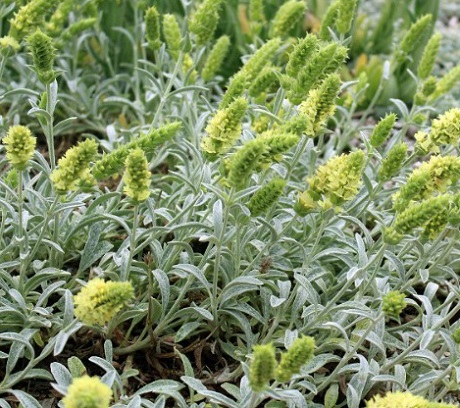New Findings Reveal Potent Anti-Inflammatory and Cancer-Fighting Compounds from a Mediterranean Herb
Nikhil Prasad Fact checked by:Thailand Medical News Team Nov 10, 2024 5 months, 1 week, 6 days, 19 hours ago
Herbs And Phytochemicals:
Ancient Remedy, Modern Benefits - Uncovering the Science Behind Sideritis
Researchers from several prominent institutions, including Johannes Gutenberg University in Germany, Bezmialem Vakif University in Turkey, and Theophrastus Paracelsus Foundation-Germany, have uncovered groundbreaking insights into the health-promoting powers of Sideritis, a traditional herb with historical roots in Mediterranean culture. This plant, often used in teas for its calming and restorative effects, may soon prove to be a valuable resource in the fight against inflammation and cancer. This
Herbs And Phytochemicals news report delves into the study, which has identified specific compounds within Sideritis that directly target inflammation and cancer-related pathways in human cells.
 New Findings Reveal Potent Anti-Inflammatory and Cancer-Fighting Compounds
New Findings Reveal Potent Anti-Inflammatory and Cancer-Fighting Compounds
from a Mediterranean Herb
In the study, the team constructed a chemical library comprising 657 phytochemical compounds extracted from Sideritis plants, meticulously documenting the individual characteristics and potential health effects of each. By focusing on anti-inflammatory and anticancer properties, researchers used advanced computational and laboratory techniques to narrow down the active compounds in Sideritis that could inhibit two specific proteins, NF-κB and NLRP3. These proteins are known to play crucial roles in inflammation and the development of cancer, and the study's focus on these targets highlights the broader potential applications of Sideritis in clinical settings.
Key Findings: Verbascoside and Apigenin Derivatives Take Center Stage
Through their extensive screening, the research team identified several phytochemical compounds with notable activity, particularly two: verbascoside and apigenin 7,4′-bis(trans-p-coumarate). These compounds showed high binding affinities to both NF-κB and NLRP3, suggesting their potential to disrupt the pathways that lead to inflammation and tumor growth.
Verbascoside emerged as the most prominent compound, showing both high abundance in Sideritis extracts and robust effects on inflammatory markers. Laboratory tests confirmed verbascoside’s strong binding ability to NF-κB and NLRP3, where it interacted directly with the proteins to halt their inflammatory action. This compound, which is also found in other medicinal plants, has long been recognized for its antioxidant properties. The study builds on these findings, showing that verbascoside has a dual impact: not only does it prevent inflammation, but it also seems to play a role in suppressing tumor cell growth.
Another standout compound, apigenin 7,4′-bis(trans-p-coumarate), demonstrated a similar affinity for NF-κB and NLRP3. While apigenin derivatives have been noted for their health benefits, this particular compound is unique to Sideritis and had not been previously explored in medical research. This makes apigenin 7,4′-bis(trans-p-coumarate) an exciting p
rospect for future anti-inflammatory and anticancer applications.
How These Compounds Combat Inflammation and Cancer
In laboratory settings, the researchers used a method known as microscale thermophoresis (MST) to test the binding strength of these compounds to their protein targets. Verbascoside and apigenin 7,4′-bis(trans-p-coumarate) both demonstrated high binding affinities, with verbascoside displaying particularly strong results in its interactions with NF-κB. The inhibition of these proteins by verbascoside is critical because both NF-κB and NLRP3 are known to be involved in a variety of chronic inflammatory diseases and cancers. NF-κB, for instance, is found in elevated levels in many types of cancer and can enhance the expression of genes that promote cancer cell survival and resistance to treatment.
Inflammation plays a significant role in the development and progression of cancers, creating a favorable environment for tumor growth and metastasis. By targeting NF-κB and NLRP3, compounds like verbascoside have the potential to disrupt this inflammation cycle, ultimately slowing down or even preventing cancer progression.
Exploring Verbascoside’s Cancer-Fighting Potential
With an interest in evaluating verbascoside’s direct impact on cancer, the research team examined its effects across 49 different tumor cell lines. They found that the compound was particularly effective against leukemia cells, with moderate effectiveness against other cancer types, including lung, colon, and ovarian cancer cell lines. Interestingly, when comparing verbascoside to 81 standard anticancer drugs, the researchers observed similar effects to those of DNA-damaging agents, which disrupt tumor cell DNA to inhibit cancer growth.
Notably, verbascoside also exhibited activity against certain drug-resistant cancer cells, offering potential for cases where conventional treatments have lost effectiveness. Unlike many standard cancer treatments, which often trigger resistance mechanisms in cancer cells, verbascoside’s unique action did not correlate with the usual pathways associated with drug resistance, such as the ABC transporters or other common resistance genes. This makes verbascoside an especially intriguing candidate for future cancer therapies.
Conclusion: A Promising Future for Sideritis in Medicine
The findings of this study point to a promising future for Sideritis-derived compounds in anti-inflammatory and cancer treatments. Verbascoside, with its dual anti-inflammatory and anticancer properties, stands out as a powerful natural compound that may complement or enhance current therapies. Its potential to target cancer cells resistant to conventional drugs is particularly valuable, as drug resistance remains a significant challenge in oncology.
Looking forward, the researchers are optimistic about the clinical potential of these compounds. With further studies, Sideritis-derived therapies could soon be part of the arsenal used to treat inflammatory conditions and cancers, potentially offering patients safer, plant-based alternatives. For now, however, this research offers a solid foundation, highlighting the untapped potential of traditional herbs in modern medicine.
The study findings were published in the peer-reviewed Journal of Ethnopharmacology.
https://www.sciencedirect.com/science/article/pii/S0378874124013734
For the latest on
Herbs And Phytochemicals, keep on logging to Thailand Medical News.
Read Also:
https://www.thailandmedical.news/news/breakthrough-study-reveals-legume-derived-peptides-as-potential-cancer-fighters
https://www.thailandmedical.news/news/the-phytochemical-oleandrin-shows-promise-in-combating-both-cancer-and-covid-19-by-targeting-grp78
